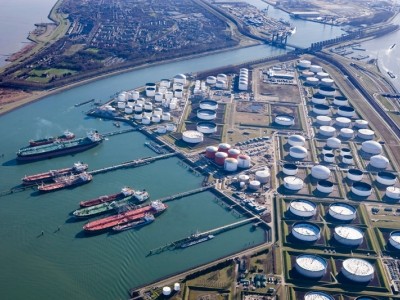Israel Targets Yemen Ports, Power Station After Renewed Houthi Attacks
By Yomna Ehab and Mohammed Ghobari ADEN/CAIRO, July 7 (Reuters) – Israel struck Houthi targets at three Yemeni ports and a power plant, the military said early on Monday, in...

SINGAPORE (Dow Jones)–Western sanctions against Iran are becoming a major headache for European and other shipping companies whose vessels refuel in Singapore, as they face penalties if they use fuel that contains any Iranian oil.
Singapore is the world’s biggest bunkering, or ship refuelling point, and the port’s practice of blending a variety of oils to make the fuel is widespread, long-established and difficult to unwind, particularly given the large number of players involved.
Each month, about 3.5 million metric tons of bunker fuel is sold in Singapore, a key transit point between markets in eastern Asia and those in the Middle East and Europe.
European shippers aren’t alone in facing the challenge of the July 1 start of an E.U. oil embargo against Iran, as major insurers have already imposed tough coverage conditions across the board.
Irrespective of whether Iranian oil is being carried as cargo or pumped into fuel tanks, its transport could invalidate insurance under E.U. rules that apply to European vessels and European insurers providing coverage for any ship.
To be safe, shippers need to be sure that the fuel they buy from the dozens of bunkering companies that operate in Singapore is guaranteed Iranian-free.
“At this point, it is not possible for us to categorically ensure that all the fuel we buy is free of Iranian blend components,” said Jesper Rosenkrans, a fuel trader with Danish shipping and oil giant A.P. Moller-Maersk (MAERSK-B.KO).
That’s because in a market where Iranian fuel oil is as ubiquitous as salt in seawater, guarantees of origin are difficult to give or get.
Coverage for about 90% of global ocean-going tonnage is organized by members of the International Group of P&I Clubs, headquartered in London.
A non-E.U. regulated shipowner using blended Iranian fuel would not be in breach if its ship did not carry the fuel inside the E.U., “but by virtue of the clubs’ sanctions rules, he would lose the benefit of his club cover and would therefore be effectively trading uninsured unless he arranges cover with a non-E.U. regulated insurer,” the P&I Group said in a response to queries from Dow Jones Newswires.
Iran is a major and growing supplier to Asia of fuel oil, used both to power ships and for direct burning in power stations and industrial furnaces, and in May, it will supply at least 8% of the fuel entering the region, traders say.
Iran often uses its own vessels, and consignments are sometimes held offshore and subsequently divided or onsold, making cargoes very difficult to track.
Singapore’s Maritime Port Authority, which regulates shipping at the port, didn’t comment.
Shippers have the option of buying from major Western companies like Royal Dutch Shell or ExxonMobil, which have their own refineries in Singapore and which could provide assurances insurers would accept–but doing so could incur higher prices charged for their fuel.
Alternatively, they could bypass Singapore and refuel elsewhere where there is less likelihood of encountering Iranian oil–something many owners won’t want to do at a time of oversupply and weak freight rates, given that the port’s fuel is the lowest-priced in the region.
France’s CMA-CGM, the world’s third largest container shipping firm, is among those taking precautions, and it is seeking guarantees from suppliers that the ship fuel does not come from Iran, the company said in an email.
Others are doing the same–a German ship charterer last week sought a written guarantee from its Singapore fuel supplier that the blended fuel it had already agreed to buy didn’t contain Iranian oil. The two are still discussing the issue.
-By Gurdeep Singh, Dow Jones Newswires

Sign up for gCaptain’s newsletter and never miss an update

Subscribe to gCaptain Daily and stay informed with the latest global maritime and offshore news


Stay informed with the latest maritime and offshore news, delivered daily straight to your inbox
Essential news coupled with the finest maritime content sourced from across the globe.
Sign Up